The Brights' Bulletin
< Previous Issue | Next Issue >
Issue #134
(Note that links in archived Bulletin issues may no longer be valid.)
BRIGHTS BULLETIN -- JULY 2014
|
Evolution Education (UK) The poster project is UK-bound! With its project (Special Initiative Group 2: Sound Science), The Brights’ Net has for some time been advancing understanding of the natural story of life on earth in science classrooms. Activities have focused in the US, but now science educators located in the UK have opportunity to request the 5-foot-wide Earth and Life: changes over time posters to benefit youngsters within certain learning settings there.
As we do in the US, Brights Central will be supplying the posters FREE to qualifying science teachers who apply while earmarked supply lasts. Please note: This is not a poster one acquires merely to decorate a classroom. Priority goes to applicants able to exhibit curricular applicability and promise of instructional usage. School employment information will be validated. Candidates must be science teachers directly providing instruction about evolutionary change to pupils at the Year 10 and/or Year 11 levels. BC is welcoming applications July 10 – September 10, 2014. |
| Back to top |
|
Infographic Language Translations
Notice to our morality infographic volunteers! (Action Arena 1 – Morality Project): With the completion of the infographic in English (see thumbnail here), we are getting ready for your assistance! You previously expressed interest in helping to meaningfully translate the text of the infographic from English into a specified language. The work will be in two parts: text of the infographic itself, and (if you will*) short text for the Brights’ website. You can expect to receive an email notice by mid-July with specifics. Timeline will be about 2 weeks. |
| Back to top |
|
Call for Social Media/PR Experts A shout-out to potential volunteers who have social media, communications and public relations expertise: You are invited to step forward and help with a specific task (Action Arena 1–Morality Project). We seek persons who would like to work with others and be completely responsible as a team for debuting the completed infographic on the Web for varied target audiences. Because of The Brights' Net's broad civic aims, ideally we hope to form a team of subject matter experts with experience in communicating social scientific concepts to the lay public and/or policymakers. If selected, you will, along with fellow Brights of similar know-how, be tasked to help the infographic garner attention via a variety of social-media sites and platforms, including and not limited to Facebook, Twitter, Buzzfeed, Mashable, Reddit, Digg, and so on. If you think that the above describes you, then please take this opportunity to apply now to briefly serve on the Project's Infographic Launch Team for Project Area C. Tell us, in a narrative of 150 words or less, about your relevant credentials and why you would be a valuable task team member for this aspect of the overall project. Email your response to the-brights@the-brights.net with LAUNCHTEAM in uppercase letters in the subject line. Please remember to include your full name and geographic location with your application. (Apply from the email address you prefer we use for follow-up inquiries and, if the address in the Brights’ database differs, please cite that in your text.)
Work duration is loosely projected to be in the vicinity of 1 month after establishment of the project team and global tasks; the team will be setting a more definitive timeline as part of its process. |
| Back to top |
|
Family Snub Likely for an Atheist? (USA) A Pew study examining political polarization reports data having ramifications for the personal lives of atheists. The bad news? (scrolling Section 3 of the report) — “Roughly half of Americans (49%) say they would be unhappy if a family member were to marry someone who doesn’t believe in God.” Even a quarter of “consistently liberal” Americans would not be keen on having an atheist in the family. A ‘born again’ Christian would be more welcome. Note: Select above image to enlarge. |
| Back to top |
|
Stereotyping of Atheists (USA) Isn’t atheism becoming more acceptable, and atheists more accepted?
Excerpt: “For those holding out for news that atheism is finally becoming a little more respected and accepted in American society, a new survey suggests that you might have to hold out for a while longer yet…While things are indeed changing, that change appears to be slow… America has a long way to go when it comes to accepting those who don't believe in God. Not believing in God is still something many people need to keep hidden, lest they be ostracized from their communities or disowned by their families… For now, if you're an atheist in America, the sad truth is there's a long way to go.” For the complete commentary: Plenty of reasons for more citizens to step up to better illuminate the naturalistic worldview, and elevate efforts in the civic sphere, |
| Back to top |
|
Non-religious in Majority? (UK)
Despite the prime minister recently declaring Britain “a Christian country,” the latest “British Social Attitudes Survey” indicates otherwise. It shows 41.1% self-identifying by some variant of Christianity, but over half of the population as having “no religion”. As freethought blogger “The Friendly Atheist” (Hemant Mehta, an Enthusiastic Bright) notes when reporting and discussing the British survey results: “Religion is losing its power and faith leaders will do everything they can to hold onto it.” |
| Back to top |
|
Education and Action (BrightsRussia) After the May launch of its YouTube channel, BrightsRussia has regularly posted more translated educational talks. Among the speakers added during June (John Searle on “consciousness”, Miguel Nicolelis on “controlling robots by thoughts”) is one Enthusiastic Bright addressing this topic of relevance to Brights: What’s behind the illusionist’s trick? Is it just a "smoke and mirrors" maneuver (i.e., props or machinery, training and practice), or is it intervention of supernatural forces? James Randi, a confirmed skeptic and former magician (“The Amazing Randi”) has been an educator on the matter. Also in June: "The Brights" social network (8000 subscribers) extended an open welcome for additional involvement by folks interested in trying their hand in various capacities: administration, working with graphics / illustrations, dubbing video, etc. as well as an invitation to acquire an experienced web developer. |
| Back to top |
|
Fairy Tales or Not? (Action Arena 2, Budding Brights) Father Christmas? Stories from the Brothers Grimm? All those talking animals in Aesop’s Fables? Tooth Fairy fibbing? What are adults doing by perpetuating these fictions?
It is not just Western culture either. Folktales abound from China, India, Japan, Persia, Vietnam, Australia, Malaysia, and many more spots on the globe. By way of such cultural transmission across generations, is humankind made more prone to become Supers? Is the mythology that so captivates young children helpful or harmful to their attaining a realistic view of the world? Opinions do vary. Some view it as enriching childhood and promoting creative thinking, while others view it as dampening skepticism and undermining good habits of thought. What are your thoughts? You can share them with other Brights on the International Forums. |
| Back to top |
|
Report from the International Forums
A paper published in the journal Pediatrics raises provocative questions about the disclosure of information obtained through various genetic testing procedures. Specifically, it appears troublingly common for “parents” to be raising someone else’s offspring. As Al-Jazeera US puts it: “Whether that occurs through a switch at the hospital, a swap of embryos or sexual infidelity, genetic testing can bring such previously unknown facts to light.” Should this information be disclosed or not? Discuss in the Topic “Disclosing Nonparentage.” In June, the Southern Baptist Convention, the leadership of a US-based religious identity, adopted a resolution concerning the legitimacy of “alternative” sexual identity, specifically decrying the label “transsexual.” Relevantly, the resolution reads in part: “We oppose all cultural efforts to validate claims to transgender identity." The reason for this rejection is that such recognition would fly in the face of “God’s good design.” It goes without saying that this resolution is controversial. Perhaps you have two cents to drop in the Topic. Registration to the Forums is quick and confidential. |
| Back to top |
|
Insights from Brights Blogging Brights is where contributors can contemplate the realities of living a life on “the bright side” (from a supernatural-free outlook). Here are some recent entries in the blog: "The End Is Near" "Complexity Takes Time” |
| Back to top |
|
Will Demographics Decide Destiny?
A recent UK Brights twitter post asked this question: The item pointed to a piece in The Telegraph noting how religions are on the rise in Africa while reproduction in countries of Europe diminishes. The title? — “Christianity will rise as sceptics die out, geneticist claims” |
| Back to top |
|
The (Poster) Power of One!
Such teacher comments make clear that the impact of a USD 25 or GBP 15 donation will go well beyond influencing merely one group of students. You can personally help shape the naturalistic understanding of literally hundreds of future citizens if you send one more evolution poster into a classroom. So, wherever you reside, please consider targeting a financial contribution to the Brights’ evolution poster endeavor. Your poster will be placed into the hands of a grateful instructor who will use it productively toward rational and supernatural-free thinking of youngsters. You can donate to the overall poster program:
or (during the 2-month UK application period), help the evolution project reach more classrooms there (clearly earmark a donation via any method for “UKPosters”): |
| Back to top |
|
Explaining Human Morality |
|
Why Do It, and How
Persons who have a naturalistic worldview are continuously "up against" what their prevailing culture presumes. They are keenly sensitive to the notion that they, because of their supernatural-free worldview, lack certain requisites to be moral persons. This, in our view, appears to be the single most significant hindrance to public disclosure that one has a naturalistic worldview. As one Bright, Angela, stated these fears: "...they will be seen as bad people, incapable of moral behavior, and shunned by society." Citizens who have a naturalistic worldview have been discriminated against throughout human history on that assumption. Today, in many places, Brights who acknowledge disbelief are viewed as morally deficient (even insane). Even in countries generally deemed economically and educationally developed, this cultural presumption (that deity-belief is a necessity for morality) is held by numerous citizens. What We Do Know Today there is strong evidence from science that human morality does not come from God or other supernatural sources. The cultural presumption, however extensively it may be held in so many societies, is false. The science of this topic is increasingly firm and engaging. Given that, the time has definitely arrived for persons in the know about “the actuality” to more seriously set about explaining human morality to ordinary citizens wherever and whenever they can. Many Brights are well positioned to do just that. The Internet is here, widely used, and information can be shared rapidly. Of course even the most appealing (to Brights) research evidence from science is complex and not easily made accessible to those who lack scientific background. And even if “what science knows” about human morality is made more comprehensible and available to ordinary citizens, it may not be persuasive to those who firmly “already know” otherwise. The ongoing Brights’ project (The “Reality about Morality” Project) has had as its goal to address some of the challenges. What We’ve Done So Far Over time, teams have been involved in examining and reviewing the research evidence from science and shaping some key conclusions thought likely to be rather readily comprehended if visually illustrated and explained by examples. For authenticity, the four scientific statements from these ongoing efforts have been endorsed by a panel of researchers in the field. Our compiled bibliography of available peer-reviewed studies is current and extensive. Having pulled all this material together, we have most recently pursued an infographic mini-project. Throughout that mini-project, our efforts have been to make the material visually appealing. The completed infographic will, we hope, intrigue a viewer and be of interest to be shared further. Although simple, it at least quickly imparts to individuals who see it the main “morality reality” ideas. Viewers who “get the idea” can then, if interested, also visit the website to learn more. There they will find simple supplemental explanations to help them better “get the idea.” What’s Next? Now comes the next phase of the project, and the idea of involving Brights themselves in distributing the information widely. Toward that end, some volunteers will be translating the infographic information into other languages, while others will lend their expertise to planning how best to launch the material to garner attention. We are ready to pursue those steps. |
| Back to top |



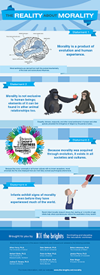

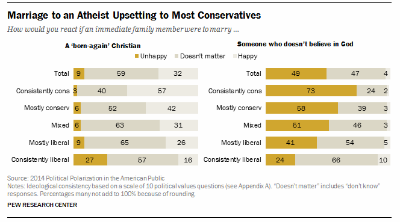
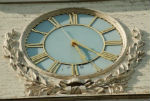
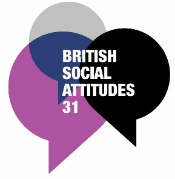



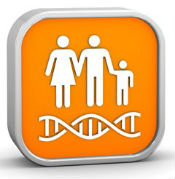


 Across the globe, societies are teeming with citizens who count as "fact" that morality is something presented to humanity by a deity through scripture (or similar assertions). This populace is convinced that people just cannot be moral without belief in God.
Across the globe, societies are teeming with citizens who count as "fact" that morality is something presented to humanity by a deity through scripture (or similar assertions). This populace is convinced that people just cannot be moral without belief in God.